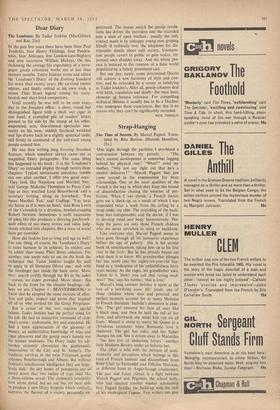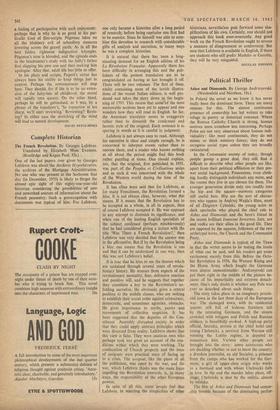Strap-Hanging
'ONE night through the partition I overheard a conversation between my parents. . . . "The boy's mental development is somewhat lagging behind his physical one." "What?" cried my mother, "why not say right out that he's a mental defective?"' Marcel Pagnol had just come second in the examination for State scholarships. One of the nicer qualities of the French is the way in which they keep this hound of dissatisfaction chasing the monster of per- fection. When I was eleven, a French doctor gave me a check-up, as a result of which I was suspended twice a week from the ceiling by a strap under my chin. The stretching of the back- bone was indispensable, said the doctor, if I was to develop mind and body harmoniously. Per- haps the paras are only those French children who are never stretched in mind or backbone.
Like everyone else, Marcel Pagnol seems to have gone through all his formative experience before the age of puberty: this is his second book of reminiscences, taking him up to his first year in the lycee. But he has already found out what there is to know. His grandmother plunges her last tooth into her eighty-six-year-old hus- band as a vindication of his unfaithfulness forty years before. As she rages, his grandfather asks, 'Listen to it. Don't you call that raving mad- ness?' No,' says his mother, 'that is love.'
Marcel's long summer holiday is spent at the feet of a terrifying jeune flue fatale, one of those children whose eyes and ponytail and perfect manners account for so many Medusas in French literature. lsabelle's dominion is abso- lute. 'The girl smeared his face all over like a black man, and then he held the tail of her dress, and afterwards she made him run on all fours.' Marcel is about to marry his Queen in a chivalrous ceremony when Romantic love is shattered. The girl has colic, and her father changes his job. She is driven away to Marseilles ----`the fast trot of abducting horses'—another little Madame Bovary under an Infanta hat.
The affair is told with the mixture of senti- mentality and perception which belongs to this kind of French humour and discomfiture from Rend Clair to Fernandel and Fdlicien Marceau, so different from its Anglo-Savage counterpart. The taut and funny climax is a fight between Marcel Pagnol and Pegomas, the school bully, who had insulted another weaker scholarship boy. Pagnol handles the build-up with the skill of his masterpiece Topaze. Few writers can give a feeling of participation with such enjoyment; perhaps that is why he is so good at his par- ticular kind of film-scripts. Pegomas takes on all the blubbery evil of schoolboy menaces lowering across the gravel yards. As in all the best fables, righteous indignation triumphs. Pdgomas's nose is blooded, and the episode ends in the headmaster's study with the b011y's father first slapping his own son and then making him apologise. After that, adult life has little to offer.
In his plays and scripts, Pagnors virtue has always been his ability to keep things just in control. Perhaps the reminiscences will stop here. They should, for if tile is to be an exten- sion of the fairy-talc of childhood, the moral will rapidly turn queasy. On the other hand, perhaps he will be galvanised. as I was, by a phrase of the translator's, `So tomorrow at ten sharp, we'll start reviewing.' Reviewing? Revis- ing? In either case the stretching of the mind will lead to mental development.
DAVID PRYCE-JONES



































 Previous page
Previous page